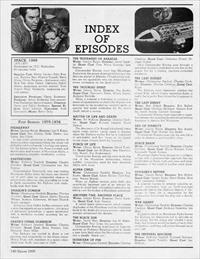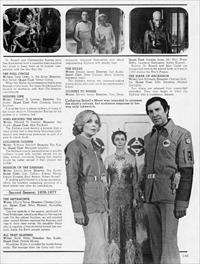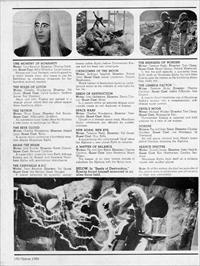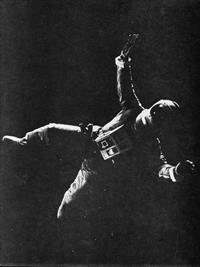Criticism
FANTASTIC TELEVISION
by Gary Gerani with Paul H. Schulman
(Harmony, US, 1977) p142-151
Fantastic Television, published in 1977, was the first major overview of science fiction television, taking a detailed critical look at genre television. It covered over 13 series including Twilight Zone, Outer Limits, Batman, Star Trek and the Irwin Allen series, with a production summary and episode guide. The only British productions were The Prisoner, and the latest series, Space: 1999. Other series were covered in brief.
Space: 1999 was still being broadcast at the time, and the last two episode titles were not available when the book was written. The review displays the same prejudices of other critics, although perhaps more thoughtfully expressed.
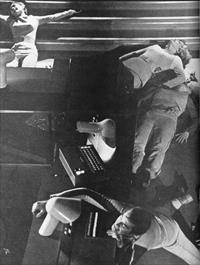
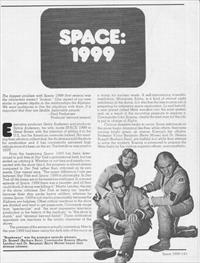
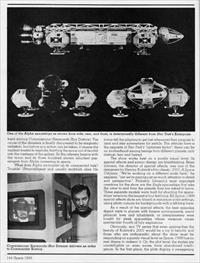
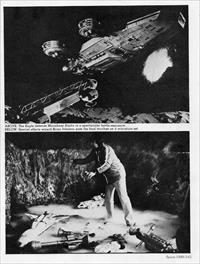
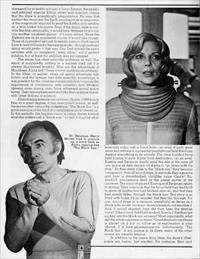
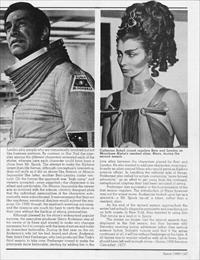
The biggest problem with Space: 1999 (first season) was the characters weren't "human." One aspect of our new stories is greater depths in the relationships [between] the Alphans. We want audiences to live the situations with them. It is important that they are likeable, believable people.
Fred Freiberger
Producer (second season)
Executive producer Gerry Anderson and producer Sylvia Anderson, his wife, made Space: 1999 in Great Britain with the intention of selling it in the U.S. but the American networks balked. Not wanting their efforts to collect dust, the Andersons sold the show for syndication and it has consistently garnered high ratings since it's been on the air. The first show was aired in 1975.
From the beginning Space: 1999 has been determined to pull free of Star Trek's gravitational field, but has ended up orbiting it. Whether or not fans and people connected with the show like it, the program is almost always compared to Star Trek rather than criticized on its own merits. One viewer says, "The major difference I can see between Star Trek and Space: 1999 is philosophy. In Star Trek all life forms are to be treated as intelligent. In a recent episode of Space: 1999 there was a monster, and all they could think of doing was killing it." Martin Landau, the star of the show, criticizes Star Trek as being too "macho" because their ship packs heavy artillery, whereas he claims Space: 1999 is not macho presumably because the Alphans are helpless. Other critical reactions to the show are divided and tend to get passionate. Comments range from "spectacular" and "the most impressive television production in the history of the medium," to "this show is dumb," and "abysmal beyond belief." These antithetical appraisals are reactions to the erratic character of the shows.
The premise of the series is actually interesting. Man in the year 1999 had been using the dark side of the moon as a dump for nuclear waste. A self-maintaining scientific installation, Moonbase Alpha, is a kind of eternal night watchman at the dump, but also has the less routine job of preparing for extensive space exploration. Lo and behold a new planet called Meta wanders into the solar system and, as a result of the mounting pressure to explore it, Commander John Koenig, clearly the best man for the job, is put in charge of Alpha.
Curious disasters begin to occur. Some astronauts on the moon begin dropping like flies, while others, their eyes turning bright green, go insane. Koenig's top officers, Professor Victor Bergman (Barry Morse) and Dr. Helena Russell (Barbara Bain), are baffled, but while they attempt to solve the mystery, Koenig is pressured to prepare the Meta flight by his visiting superior officer, unsympathetic, hard-driving Commissioner Simmonds (Roy Dotrice). The cause of the disasters is finally discovered to be magnetic radiation, but before any action can be taken, it causes the nuclear wastes to explode, hurtling the moon out of its orbit into the vastness of the galaxy. So the odyssey begins with the moon and its three hundred eleven reluctant passengers from Alpha careering in space.
What does Alpha encounter on its unexpected trek? Trouble! Ultraintelligent and usually snobbish alien life forms tell the pilgrims to get lost whenever they propose to land and stay somewhere for awhile. The attitude here is the opposite of Star Trek's "optimism factor": there can be no brotherhood among beings from different planets, only distrust, fear and hatred.
The show works best on a purely visual level. Its special effects and scenic design are breathtaking. Brian Johnson, the director of special effects, was one of the designers for Stanley Kubrick's film classic, 2001: A Space Odyssey. "We're working on a different scale here," he explains, "yet we're paying just as much attention to detail and perspective." Probably Johnson's most important creations for the show are the Eagle spaceships that take the crew to and from the planets they are asked to leave. Three separate models were built for shooting the spaceships' exteriors; the largest is four feet long. All Space: 1999 special effects shots are filmed in miniature scale settings using photo cutouts for backgrounds with a tabletop base.
As a result of the special effects, the best episodes depict visits to planets with bizarre environments, weird physical laws and inhabitants, or interplanetary wars fought by sleek spaceships whose weapons cause spectacular Fourth of July explosions.
Obviously, any TV series that even approaches the beauty of Kubrick's 2001 would be a joy to behold, and those who are enthusiastic about the show must be responding on a purely visual level as Space: 1999 has no real drama to redeem it. On the plot level, the stories are unintelligible or, even worse, have abandoned intelligence. In the first place the plots display a swaggering disregard for scientific accuracy. Isaac Asimov, the prolific and admired science fiction writer and scientist, claims that the show is scientifically preposterous. He says that neither the moon nor the Earth could survive an explosion of the magnitude required to send the Earth's only satellite on a wild junket into space. Even if the moon were to survive this first catastrophe, it would take lifetimes for it to run into another inhabited planet- if it were aimed. Since the Alphans are on an accidental course, it would take longer. Those of us prudent enough to remain here on Earth would have to wait millennia for the next episode- though perhaps many would prefer it that way. Star Trek solved the same problem with an imaginary "warp drive," not a perfect solution, but at least the problem was not ignored. [The problem isn't ignored in Space: 1999 either, as it made frequent reference to space warps moving the Moon light years through space. It isn't any more "scientific" than Star Trek, but the series gives an explanation.]
The series has other scientific problems as well. The moon is supposedly drifting in a sunless void, yet it is always illuminated brightly. How are the inhabitants of Moonbase Alpha fed? These are not quibbles about detail. In the fifties, or earlier, when all space adventure was fictional and the layman had little scientific knowledge, it was possible for the creators of science fiction to ignore the importance of consistency with scientific fact. Modern viewers, even young ones, have witnessed actual space travel. They are sophisticated and like their science fiction with large dollops of science. [The illumination complaint is copied - inaccurately- from the Cue article by Asimov. In fact the Moon is often travelling through solar systems and is always shown with strong shadows. Several episodes addressed how the the Alphans were fed, and even showed the hydroponic gardens. The series did make some bad scientific errors, but Gerani rushes to pick errors it simply didn't make.]
Abandoning science has not been Space: 1999's only flaw; to a great degree, it has abandoned reason, as well: the stories often cannot be understood. "The Black Sun" is a good example of the kind of unintelligible plots offered up. In this episode, the hapless moon is being drawn toward what the writers call a "black sun." In fact, it must be what scientists today call a black hole- an area of such great mass and with such a powerful gravitational field that it can destroy everything in its vicinity. The crew builds a force field hoping to save Alpha from destruction- to no avail. Koenig and Bergman finally send the rest of the crew off into space as they remain on Alpha to "go down with the ship." As they draw close to the "black sun" they become transparent, then all sound stops. In seconds, they age eons and hear a disembodied, childlike voice (Gods? Kubrick's?) proclaiming itself as the prime mover of the universe. The voice stops, and Koenig and Bergman return to normal. They conclude that the force field they had built to stave off destruction had worked after all, and that they had simply fallen through the black sun. This story is so filled with holes it's no wonder that they fell through. For one, sound stops in a vacuum, something as dense as a black hole would increase its transmission, not smother it. And, if sound stopped, how did they hear the strange voice? If their force field had worked, how is it that they got sucked into the black sun anyway? Most importantly, what did the whole experience mean? Great dramatic emphasis is placed on it but no follow-up or explanation is ever offered. It is pure phantasmagoria. Unfortunately, "The Black Sun" is not unique in its flaws; many of the other stories are equally fatuous. [Asimov also picked on Black Sun. Gerani seems to be working from the inaccurate ITC publicity information, not from actually watching the episode. The sound argument is not based on anything in the episode: no-one states sound will stop in the black sun, and it plainly doesn't (Gerani's comment that the dense black hole will increase sound is absurd- it's a singularity, not an atmosphere). Of course, asking what it means is the entire point.]
In addition to the inane story lines, the show's characters are heroic, but wooden. For instance, Bain and Landau play people who are romantically involved but act like business partners. By contrast, in Star Trek the interplay among the different characters animate each of the stories, whereas here each character could have been a clone from Mr. Spock. The attempt to make the Alphans larger-than-life heroes, although conceptually interesting does not work as it did on shows like Batman or Mission: Impossible (the latter, another Bain-Landau co-star venture). On the former the approach was "high camp" and viewers accepted- even expected- the characters to be stilted and predictable. On Mission: Impossible the viewer was so involved with the intense, cleverly designed plots that the individual personalities of the characters automatically were subordinated. It was necessary that they act like machines; emotional displays would subvert the missions. On 1999, though, the approach is serious, not camp, and the missions are much too hazy to carry the show on their own without the backup of strong personalities.
Although pleased by the show's widespread popular success, the executive producer Gerry Anderson was all too aware of its flaws and wanted to make any changes necessary for it to comply with the laws of nature and make its characters believable. During its first year on he air, Anderson's wife left his bed, board and show. Anderson then hired Fred Freiberger, who had produced Star Trek's third season, to take over. Freiberger vowed to make the principals more believable, starting by adding fire to the love affair between the characters played by Bain and Landau. He also wanted to add new characters, most significantly an alien named Maya who would serve as Alpha's science officer. In handling the editorial side of things, Freiberger also called for scripts containing "more honest adventure," as an effort to get away from the confused metaphysical claptrap they had been accused of airing.
Freiberger was successful in the humanization of the first season regulars. The introduction of Maya however was not the wisest move. Audiences looked upon her as a gimmick- a Mr. Spock rip-off, a token, rather than a resident, alien.
As the end of the second season approached, the series had actually slipped in popularity and was dying out on both coasts. In New York they resorted to using Star Trek reruns as a lead-in to Space.
The stories no longer had the absurd aspects they displayed in the fist season, but they became silly Saturday morning action adventure rather than serious science fiction. Industry rumours said that if the series continued at all, it would be without Freiberger at the helm. It all leaves one to wonder whether with all its flaws, Space should have left well enough alone- Space: 1999 became Canceled: 1977.
The episode guide is based on incorrect ITC publicity, hence Dorzak is written by Pip and Jane Baker, the episode titles "Devil's Moon" and "The Chrysalis A-B-C"; the title "Seeds of Destruction" (plural) and mis-identified photo are probably Gerani's.
